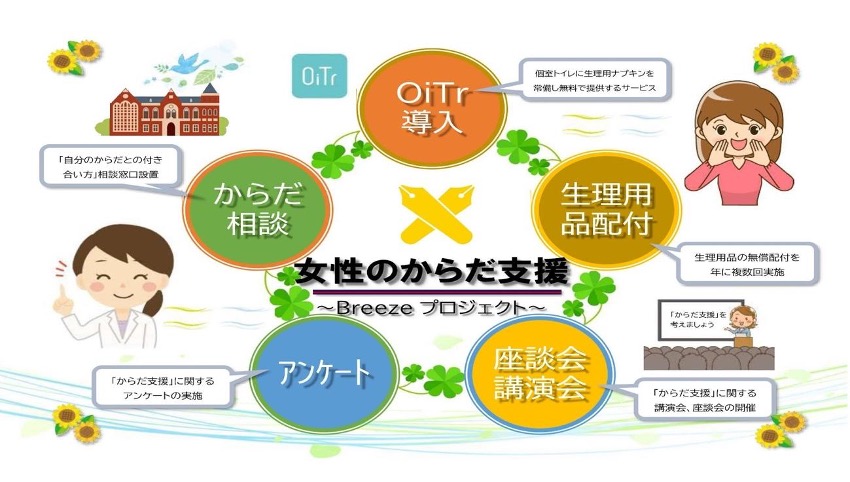Don’t Handle Worries on Your Body Alone —“Breeze Project” for Supporting Women’s Health (2/2)
In the first part of our interview, we asked Ms. Kuroda, Mr. Nakamine, and Ms. Uzawa from the Keio University Office for Equity, Diversity, and Inclusion about the “Breeze Project”, which provides students at Keio with a series of support for women’s bodies, such as regularly distributing sanitary pads free of charge and holding lectures on health issues.
In the second part of the interview, our discussion focused on the current growing attention to the issue of women’s health in society.

a series of initiatives in the “Breeze Project”
How Did a Female Issue Become a Social Issue?
Since topics related to body issues such as menstruation and menopause are considered to be too personal, people often feel a sense of hesitation to share those topics with others. “As a teenager, talking about menstruation with my father was kind of taboo,” said Ms. Kuroda. Nevertheless, in recent years, the issue of women’s health and menstruation has become a hot topic of discussion in society. Our purpose for this discussion is to grasp the factors that bring about this social shift.
Ms. Uzawa points out that one factor may relate to discussions on social media such as Twitter about menstrual poverty among elementary school students. In response to the current situation of elementary and junior high school students not being able to prepare sanitary products due to their families’ financial hardships, there was a lively discussion that sanitary products should be stocked in the school nurse’s room and distributed to students in need. After these discussions, so-called “period poverty” among college students and working members of society has been brought to the table, said Ms. Uzawa. She also noted that the issue of poverty attracted more attention during the COVID-19 pandemic and may have been linked to menstrual poverty as well. In 2021, a TV drama “Our Rainy Days” was broadcast on NHK. The story is about a female photographer dealing with severe premenstrual syndrome (PMS). Ms. Uzawa thinks that the broadcasting of such a drama by a main TV station in Japan is a reflection of social change.
Mr. Nakamine analyzes this social change as follows: Due to the COVID-19 pandemic, the financial situation of families in Japan is worsening. Correspondingly, many students at Keio have been driven into financial challenges during the pandemic. To protect the livelihood of the students, the “food support project” was implemented by the Student Affairs Department of Keio University in the spring semester of 2021. Students who have fewer incomes at their part-time jobs or are living away from their parents are eligible for this program, which provides 3,000-yen worth of meal coupons to purchase groceries at the Student Co-op Cafeteria and the University Co-op Purchasing Department on each campus. The distribution of sanitary napkins in the Breeze Project started in the same framework as this “food support project”. Women’s health issues may have become apparent because of the financial difficulty students and parents are experiencing during the pandemic, he said.
Ms. Kuroda presented her viewpoint according to the recent global movements such as the Sustainable Development Goals (SDGs), long-term principles advocated by the United Nations since 2015. Some of the goals are, for example, “No Poverty” or “Gender Equality”. However, as for gender equality, so little has this goal been achieved here in Japan: the percentage of female executives in companies is still low, and women have not been promoted very far in their careers, while women’s participation in society has been called for. Some of the major concerns for women in their social and career self-realization are their physical hardships such as menstruation, pregnancy, childbirth, and menopause. As the need for comprehensive care of women’s bodies is being called for, menstrual problems are now considered a topic that should be addressed in a socially comprehensive way, she said.
Also, in recent years, so-called “minorities” in society have been raising their voices for the same consideration as those of the “majority”. For example, more and more LGBTQ+ people are speaking up to make themselves understood by society, and we cannot deny that many people are trying to respond to these movements positively. Now, what has long been regarded as “Taboo” is being spoken out loud in society along with the topic of women’s health issues.
Written by Sarah Marlowe and Aya Nakao
Edited by Xingyou Li (Lisa)


